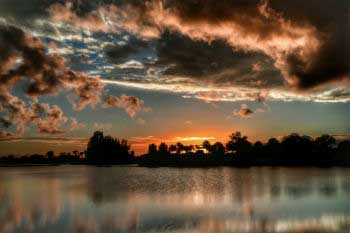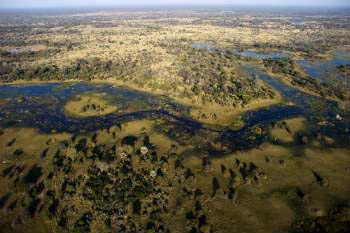Peatbogs, lakes, rivers, estuaries, wet grasslands, mangroves, coral reefs, deltas, coastal waters, tidal flats; and also artificial sites such as rice paddies, fish ponds, salt marshes and reservoirs. More than two thousand wetland scattered on almost 170 countries around the world are today celebrating.

Every February 2 from 1977 the World Wetlands Day takes place to commemorate the signing of the Ramsar Convention (Iran), which main objective is "the conservation and wise use of all wetlands through local and national actions and international cooperation, as a contribution towards achieving sustainable development throughout the world."
Since then, more than two thousand sites that currently make up the list of The Ramsar Sites enjoy special protection and are subject to specific plans of wise use.
Why are wetlands so important?
These territories have a great importance since they are ecosystems that harbor high biodiversity. They are also natural regulators of the climate and the water cycle and help control floods and droughts. They generate hydrological resources that supply water to populations in their area of influence, both for consumption and for agricultural and livestock use, and are also areas of work activity or recreation for humans such as fishing and tourism.
and the water cycle and help control floods and droughts. They generate hydrological resources that supply water to populations in their area of influence, both for consumption and for agricultural and livestock use, and are also areas of work activity or recreation for humans such as fishing and tourism.
World Wetlands Day 2023
This year’s theme is an appeal to work to wetland regeneration, all under the slogan: “Revive and restore degraded wetlands".
Over 1 billion people, according to the Ramsar Convention, depend directly or indirectly on wetlands through fishing, agriculture, tourism, water supply, etc. This is why World Wetlands Day is this year promoting the use of the hashtag #GenerationRestoration and #ForWetlands with the aim of reminding people that these areas are not exclusively wild. Regrettably, 63% have disappeared since 1900.
ACCIONA and the restoration of wetlands
Aware of the great importance of these ecosystems, ACCIONA actively participates in various innovation and restorations projects. It's the case of these three initiatives:

- Restoring and creating new wetlands in Canada: because of the construction of the Stoney Trail Ring Road in Alberta (Canada), ACCIONA has prioritized the preservation of ecosystems and species in the area where works are undertaken with the creation of new hectares of wetlands.
- New wetland using renewable energies: in collaboration with the Foundation for Research in Ethology and Biodiversity, ACCIONA has generated a new riverbank ecosystem by creating a wetland and planting over 400 native trees. In addition, solar panels will be used for water extraction.
- Restoration of peat bogs and creation of wetlands in Spain: ACCIONA Medio Ambiente has restored peatland areas in Basconcillos del Tozo and Úrbel del Castillo (Burgos, Spain)
Sources: Ramsar Convention, World Wetlands Day, The Ramsar Sites and Criteria for Identifying Wetlands of International Importance. https://mediacdn.acciona.com/content/dam/sostenibilidad/media/3514685/folleto_biodiversidad_es_2019-4-9_-acciona.pdf